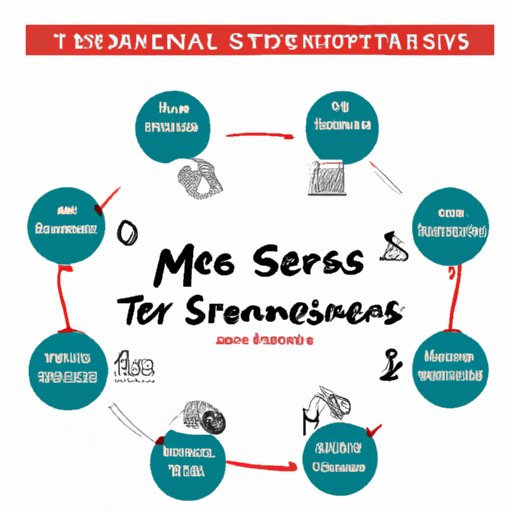
Overcoming Stress: Strategies and Techniques for Finding Peace
Stress is a common problem that many of us face in our daily lives. It can come from work, relationships, finances, or any number of other sources. While a small amount of stress can actually be helpful in motivating us to complete tasks, too much stress can have a negative impact on our mental and physical health. Therefore, it is important to develop effective strategies to help manage and overcome stress. In this article, we will explore some simple and effective techniques that can help you find peace and achieve balance in your life.
6 Simple Strategies to Combat Stress and Find Peace
In order to combat stress, it is important to develop effective coping techniques. The following are a few simple strategies that can make a big difference:
1. Prioritize and organize tasks
One of the main sources of stress can be feeling overwhelmed by too many tasks or responsibilities. By prioritizing and organizing your tasks, you can help reduce stress and achieve a greater sense of control over your life. Consider creating a to-do list, breaking larger tasks into smaller ones, and setting realistic deadlines for yourself.
2. Practice breathing techniques
Deep breathing is a simple and effective way to reduce stress and calm the mind. By focusing on your breath and taking slow, deep breaths, you can lower your heart rate and reduce tension in your body. Try setting aside a few minutes each day to practice breathing exercises, such as diaphragmatic breathing or alternate nostril breathing.
3. Practice gratitude and positive thinking
Focusing on the positive aspects of your life can help you feel more grateful and optimistic. Take time each day to reflect on the things you are thankful for, and try to reframe negative thoughts in a more positive light. For example, instead of thinking “I’m so stressed about this deadline,” try to focus on the fact that you have the skills and resources to complete the task.
4. Build a support system
Having a support system can be incredibly helpful in managing stress. This can include friends, family members, or mental health professionals. Reach out to those who you trust and who can offer you support and guidance. It is not a sign of weakness to ask for help.
5. Engage in relaxing activities
Incorporating relaxing activities into your daily routine can help reduce stress and promote a greater sense of calm. This can include things like reading a book, taking a warm bath, or going for a walk in nature. Find activities that you enjoy and that help you unwind.
6. Learn to say no
One of the most powerful things you can do to reduce stress is to set boundaries and learn to say no when appropriate. Sometimes we may feel pressured to take on more than we can handle, but this can ultimately lead to burnout and increased stress levels. Recognize your limits and prioritize your own well-being.
The Top Ways to Manage Stress and Feel More Relaxed
In addition to the strategies mentioned above, there are a few other key ways to manage stress and promote relaxation:
1. Exercise regularly
Exercise is a great way to release tension and boost mood. Try to engage in regular physical activity, such as yoga, running, or strength training. Even a short walk can help reduce stress and promote relaxation.
2. Clean and declutter the environment
Our physical environment can have a big impact on our mental state. Take some time to declutter your living space, organize your belongings, and create a calm and peaceful atmosphere.
3. Get enough sleep
Good-quality sleep is essential for managing stress and promoting overall health and well-being. Aim for 7-9 hours of sleep each night, establish a regular sleep schedule, and practice good sleep habits such as avoiding electronics before bed.
4. Take regular breaks
It can be easy to get caught up in our work or responsibilities, but taking regular breaks can help reduce stress and improve productivity. Take a short walk, meditate, or simply step away from your work for a few moments to recharge.
5. Minimize the use of technology
While technology can be helpful in many ways, it can also contribute to stress and overwhelm. Set aside designated times to check email or social media, and try to disconnect from technology during periods of relaxation or downtime.
Master the Art of Relaxation: Effective Techniques for Reducing Stress
Relaxation techniques can be incredibly helpful in reducing stress and promoting a greater sense of calm. The following are a few techniques to consider:
1. Deep breathing
As mentioned above, deep breathing is a simple yet effective way to reduce stress. Try taking slow, deep breaths and focusing your attention on your breath.
2. Meditation
Meditation involves focusing your attention on the present moment in a non-judgmental way. This can help reduce stress and promote greater self-awareness. Consider trying guided meditations or breathing exercises to help get started.
3. Aromatherapy
Using essential oils such as lavender or chamomile can help promote relaxation and reduce stress. Try using a diffuser or adding a few drops of essential oil to a warm bath.
4. Yoga
Yoga combines physical movement with deep breathing and mindfulness, making it a great way to reduce stress. Consider taking a yoga class or following along with a video on YouTube.
5. Progressive Muscle Relaxation
This technique involves tensing and then relaxing different muscle groups in the body, helping release tension and promoting relaxation. Try tensing and relaxing your muscles from your feet to your head, taking slow, deep breaths as you do so.
Tackle Stress Like a Pro: Methods to Overcome and Cope with Stressful Situations
In addition to the techniques above, there are several key methods that can help you cope with and overcome stressful situations:
1. Identify and control the source of stress
It is important to identify the source of your stress in order to effectively manage it. Consider what specific situations or triggers are causing you stress, and brainstorm potential ways to address or avoid these situations.
2. Use positive affirmations to combat stress
Positive affirmations can help reframe negative thoughts and shift your mindset toward a more positive outlook. Consider using affirmations such as “I am capable of handling whatever comes my way” or “I am worthy of love and respect.”
3. Use visualization exercises
Visualization exercises involve imagining yourself in a peaceful or positive scenario, such as lying on a beach or surrounded by loved ones. This can help reduce stress and promote relaxation.
4. Practice time management techniques
Effective time management can help reduce stress by allowing you to prioritize tasks and minimize procrastination. Consider creating a schedule or implementing the Pomodoro technique, which involves working for 25 minutes followed by a 5-minute break.
5. Use humor to alleviate stress
Laughter can be an effective way to reduce stress and improve mood. Watch a funny movie, read a humorous book, or spend time with a friend who makes you laugh.
From Meditation to Exercise: Proven Methods for Reducing Stress and Finding Balance
There is a strong connection between the mind and body, and engaging in certain activities can help promote both physical and mental health. The following are a few activities to consider for reducing stress and finding balance:
- Meditation or deep breathing exercises
- Yoga or tai chi
- Running or other forms of aerobic exercise
- Swimming or other forms of low-impact exercise
- Dance or movement-based activities

Stress Management 101: Essential Tips and Tricks to Overcome Stress in Everyday Life
Managing stress is an ongoing process that requires consistent effort and attention. The following are a few essential tips and tricks to help you overcome stress in your everyday life:
1. Stay organized
Staying organized can help reduce stress by allowing you to prioritize tasks and make efficient use of your time. Consider using a planner or to-do list to help keep track of your responsibilities.
2. Surround yourself with positivity
Positive relationships and a supportive environment can help reduce stress and improve well-being. Spend time with people who uplift and support you, and try to create a positive atmosphere in your home or work environment.
3. Practice mindfulness
Mindfulness involves paying attention to the present moment in a non-judgmental way. By cultivating a greater sense of awareness, you can reduce stress and improve mental clarity. Try incorporating mindfulness exercises into your daily routine, such as mindful breathing or body scans.
4. Take care of your physical health
Good physical health is essential for managing stress. Aim to eat a healthy, balanced diet, engage in regular physical activity, and avoid unhealthy habits such as smoking or excessive alcohol consumption.
5. Practice self-care
Self-care involves taking intentional steps to promote your own health and well-being. This can include things like taking a relaxing bath, reading a book, or getting a massage. Make self-care a regular part of your routine.
Conclusion
Managing stress is an ongoing process that requires consistent effort and attention. By incorporating some of the strategies and techniques discussed in this article, you can begin to reduce stress and promote greater peace and well-being in your life. Remember to prioritize self-care and seek support when you need it. With time and practice, you can learn to overcome stress and achieve greater balance and happiness.





